Liverpool must improve their squad to remain competitive under Arne Slot
The final whistle at Anfield against Paris Saint-Germain seemed to mark something more ominous than just Liverpool’s Champions League exit—it may have signalled the end of an era. As Mohamed Salah wiped away tears following the penalty shootout defeat, the stark reality facing Arne Slot’s Liverpool became impossible to ignore.
Despite inheriting a squad that underwent significant investment in Jürgen Klopp’s final season, the Dutchman now faces critical decisions about where to strengthen if Liverpool are to challenge Europe’s elite again.
Liverpool’s sporting directors must now face uncomfortable truths about the squad’s limitations. While summer 2023’s investment refreshed the midfield, other areas remain problematic — the positions where quality and depth are lacking, and where elite competitors have maintained higher standards.
The margins between success and failure at the highest level are razor-thin, and Liverpool cannot afford complacency in the transfer market if they wish to challenge domestically alongside the continental powerhouses in Europe.
It’s obviously very harsh that Slot ended up facing PSG despite topping the Champions League group stage table, yet evert time the Reds are beaten, the fragilities in their squad are exposed that bit more.
With the league title all but wrapped up, attention can soon turn to next season, and the areas we think the Reds can improve – free bets likely to tip them to retain the title alongside a Champions League campaign that they hope will go beyond the last 16. Here are the positions that need the most work.
Left Wing
Luis Díaz arrived at Liverpool in January 2022 amid tremendous fanfare, with his electric performances for Porto and Colombia promising a worthy heir to Sadio Mané’s left-wing throne. Three years later, that promise remains frustratingly unfulfilled.
The Colombian international has flashed moments of brilliance, but the numbers tell a sobering story. Díaz’s conversion rate ranks among the lowest for elite forwards in Europe’s top five leagues. Against PSG, he squandered three clear opportunities that a truly world-class winger would have buried. His tendency to cut inside predictably rather than vary his approach has made him easier to defend against, particularly in crunch European fixtures where spaces are limited.
Centre-Forward
Liverpool’s striker conundrum represents perhaps their most pressing concern. The departure of Roberto Firmino left a void that neither Diogo Jota nor Darwin Núñez have consistently filled, albeit for different reasons.
Jota, when fit, has demonstrated clinical finishing and intelligent movement that align perfectly with Liverpool’s system. The problem lies in those two crucial words—”when fit.” The Portuguese forward’s injury record has become increasingly troubling, with muscular problems repeatedly interrupting his seasons.
His absence during crucial fixtures has forced Liverpool to constantly reshuffle their attack, disrupting rhythm and partnerships. Even more concerning is his barren run in the Champions League, having not found the net in the competition for four years—an astonishing drought for a player of his quality.
Núñez presents an entirely different set of issues. Now in his third season at Anfield following his £85 million move from Benfica, the Uruguayan remains an enigma. His physical attributes—blistering pace, aerial prowess, and relentless work rate—are undeniable.
Yet his erratic finishing and questionable decision-making continue to undermine his effectiveness. Against PSG, Núñez’s profligacy was painfully evident, with multiple chances spurned that elite strikers simply must convert.
While patience is a virtue, three seasons represents sufficient time to judge a striker at this level. The harsh reality is that Núñez appears unlikely to develop the composure and technical refinement required to lead the line for a club with Liverpool’s ambitions.
Left-Back
Few players have embodied Liverpool’s recent success more than Andrew Robertson. The Scotsman’s journey from Hull City castoff to Champions League and Premier League winner represents one of football’s great modern success stories. His tireless running, pinpoint crossing, and indomitable spirit have made him a cornerstone of Liverpool’s triumphs under Klopp.
However, the signs of decline have become increasingly difficult to ignore this season. At 30, Robertson appears to have lost the explosive acceleration that once allowed him to dominate his flank for 90 minutes. His defensive positioning has grown more suspect, and his once-telepathic understanding with forwards has deteriorated, resulting in fewer quality chances created.
Against PSG, Robertson found himself repeatedly caught out of position, unable to recover with the pace that once defined his game.
While Kostas Tsimikas provides cover, the Greek international lacks the all-round quality to serve as more than a capable deputy. Liverpool require either a high-calibre competitor to push Robertson or, more realistically, a successor to gradually phase in as the Scotsman’s minutes are managed.
The market offers intriguing options. Fulham’s Antonee Robinson has developed into one of the Premier League’s most consistent left-backs, combining defensive solidity with attacking enterprise. Bournemouth’s Milos Kerkez, meanwhile, represents a more youthful option whose aggressive style and crossing ability would suit Liverpool’s system perfectly.
